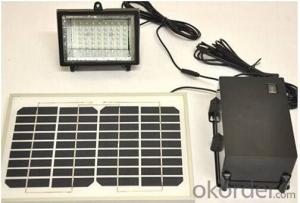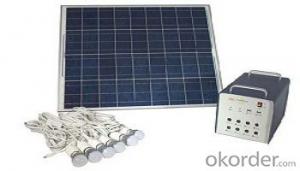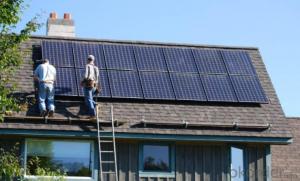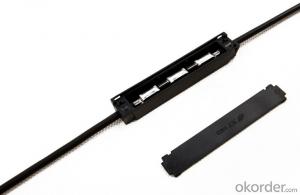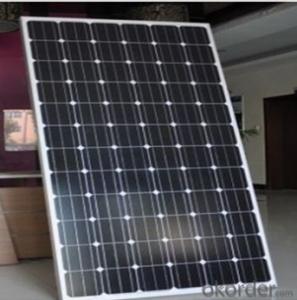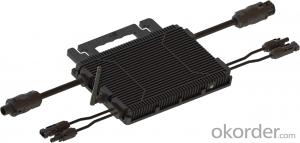CNBM Solar Home System Roof System Capacity-25W-3
- Loading Port:
- Shanghai
- Payment Terms:
- TT or LC
- Min Order Qty:
- 10 set
- Supply Capability:
- 30000 set/month
OKorder Service Pledge
OKorder Financial Service
You Might Also Like
Introduction of Solar Home System
Solar Home System is composed by Solar Panels, Inverters, Charger Controller, Battery, Cable, Mounting Bracket, which is applied to produce electricity for home use.
Solar Home System is quite suitable product in urban area and the place which is short of electricity. Our Small Solar Home System own great benifits compare with other kind electricity resources:
Electricity generating cost of Solar Home System is much cheaper than diesel engine. Beside low electricity making cost, solar system products also have the features of noiseless, clean energy, environmentally friendly and can access to many different electric appliance.
Working Principle of Solar Home System
The stand alone Solar Home System is an off-grid solar system which uses batteries to store the solar energy. Stand alone solar system solutions design for those who are not able or willing to connect to electricity grid.
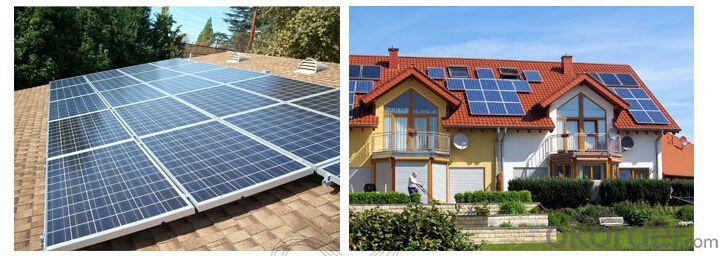


Terms and Conditions
1. Trade terms: FOB Shanghai
2. Payment terms: 30% T/T, balanced before shipment/ LC at sight before shipment. Actual Terms can be negotiated for big order.
3. Package: Exported standard package suitable for tough handling and sea transport.
4. Delivery: Goods to be ready within 10~30 days depending on order quantity.
5. Warranty: 10 years for solar panel, 2 years for controller/inverter/battery.
FAQ
Q: Required mainly certificates (CE&IEC/TUV/RoHS)?
A: Our products are certificated by CE RoHS, IEC, ISO, TUV, UL etc.
- Q:How can solar energy systems reduce electricity bills?
- Generating free and renewable energy from the sun, solar energy systems have the potential to significantly decrease electricity bills. Unlike conventional electricity sources like fossil fuels, solar energy doesn't necessitate ongoing expenses for fuel or maintenance. Once installed, a solar energy system can produce electricity for many years, offsetting a substantial portion of a household's or business's electricity usage. By utilizing the power of the sun, solar energy systems can generate electricity when it is most in demand during daylight hours. Consequently, solar energy can directly compensate for electricity consumption during peak times, diminishing the need to draw power from the grid. Consequently, electricity bills can be drastically reduced or even eliminated, depending on the size and efficiency of the solar energy system. Furthermore, solar energy systems often provide homeowners and businesses with the opportunity to take advantage of numerous financial incentives and programs. These incentives may include tax credits, grants, or policies such as net metering, which allows surplus solar energy to be fed back into the grid and credited towards future electricity bills. These incentives can augment the financial advantages of installing solar energy systems, making them even more cost-effective. Additionally, solar energy systems offer long-term savings. As the cost of electricity from conventional sources continues to escalate, solar energy remains a steadfast and predictable investment. By securing a fixed cost for electricity generation, solar energy systems safeguard against future price hikes and inflation, ensuring that electricity bills remain low and foreseeable for years to come. Overall, solar energy systems provide a sustainable and economically viable solution for reducing electricity bills. By tapping into the abundant and free energy of the sun, households and businesses can enjoy substantial savings, financial incentives, and long-term stability in their energy costs.
- Q:Can solar energy systems be used in all locations?
- Solar energy systems can be used in most locations, but their efficiency and effectiveness may vary depending on factors such as sunlight availability, climate, and geographical location.
- Q:Can solar energy systems be used in areas with high air pollution?
- Yes, solar energy systems can be used in areas with high air pollution. While air pollution can reduce the efficiency of solar panels by blocking sunlight, advancements in technology have made solar panels more resilient to these conditions. Additionally, regular maintenance and cleaning can help mitigate the impact of air pollution on solar energy systems. Despite the reduced efficiency, solar energy can still be a viable and sustainable option in areas with high air pollution.
- Q:How do solar energy systems impact wildlife and ecosystems?
- Solar energy systems have minimal negative impacts on wildlife and ecosystems compared to other forms of energy generation. They do not emit harmful pollutants or contribute to climate change, reducing habitat destruction and protecting biodiversity. While there may be some localized impacts during construction and maintenance, proper planning and design can mitigate these effects. Overall, solar energy systems have a positive influence on wildlife and ecosystems by helping to create a more sustainable future.
- Q:How to calculate the income of photovoltaic system
- Hypothesis: 1 my peak electricity price of 1 yuan / degree, the flat price of $0.7 / degree, the local coal desulfurization unit benchmark price of 0.4 yuan / degree. 2 my home at noon to 1 points solar power generation of 90 degrees, power consumption of 40 degrees; in the afternoon from 5 to 6 solar power generation of 10 degrees, power consumption of 60 degrees. Results: 1 according to the total solar energy power generation and the total energy consumption calculation two times my solar power electricity is 100 degrees, 100 degrees, more than electricity difference is zero; so I save electricity 85 yuan, receive subsidies 35 yuan, the total revenue of 100kWh * [(1 + 0.7) /2 + /kWh = 0.35 yuan) 120 yuan.
- Q:Can solar energy systems be used for emergency response operations?
- Yes, solar energy systems can be used for emergency response operations. Solar panels can generate electricity even during power outages, providing a reliable and sustainable source of energy to power critical equipment and facilities. Solar-powered generators can also be used to charge communication devices, run medical equipment, provide lighting, and support other emergency response activities in remote or disaster-stricken areas where access to traditional power sources may be limited or disrupted. Additionally, solar energy systems can help reduce dependence on fossil fuels and contribute to a more sustainable and resilient emergency response infrastructure.
- Q:Can solar energy systems be used for powering wineries?
- Yes, solar energy systems can definitely be used for powering wineries. Solar power is a sustainable and renewable energy source that can provide a consistent and reliable source of electricity for winemaking operations. Wineries typically require a significant amount of energy for various processes such as crushing grapes, fermentation, cooling, bottling, and storage. By installing solar panels, wineries can generate their own electricity, reducing their reliance on fossil fuels and lowering their carbon footprint. Solar energy systems can be installed on the roofs of winery buildings or in nearby open spaces such as vineyards. These systems consist of solar panels that convert sunlight into electricity through the photovoltaic effect. The generated electricity can be used directly to power winery operations or stored in batteries for later use, ensuring a continuous power supply even during cloudy days or at night. One of the major advantages of using solar energy in wineries is the potential for long-term cost savings. While the initial installation cost of solar panels may be relatively high, the operational costs are significantly lower compared to traditional energy sources. Once the solar system is installed, wineries can benefit from reduced or even eliminated electricity bills, resulting in substantial savings over the system's lifespan. Furthermore, solar energy systems for wineries can be designed to meet specific energy needs. By conducting a thorough energy assessment, wineries can determine their electricity demand and tailor the solar system accordingly. This allows wineries to have a customized solution that meets their energy requirements and ensures optimum performance. In addition to the financial and environmental benefits, using solar energy in wineries can also enhance the brand image and reputation. Consumers are increasingly conscious of sustainability and environmentally friendly practices, and wineries that demonstrate a commitment to clean energy can attract eco-conscious customers. This can lead to increased sales and customer loyalty. Overall, solar energy systems are a viable and efficient option for powering wineries. By harnessing the power of the sun, wineries can reduce their reliance on conventional energy sources, lower their operating costs, and contribute to a greener and more sustainable future.
- Q:What is the role of grounding systems in a solar energy system?
- The role of grounding systems in a solar energy system is to ensure safety and protect the system and its users from electrical faults and lightning strikes. Grounding refers to the connection of electrical equipment and components to the Earth's surface, creating a low-impedance path for electrical faults to flow, thus preventing the buildup of excessive voltages that could pose a risk to people and equipment. In a solar energy system, grounding serves several important purposes. Firstly, it provides protection against electrical shock by redirecting any fault currents into the ground, minimizing the potential for injury. This is crucial as solar panels and inverters are exposed to sunlight and could be touched by people during maintenance or repairs. Secondly, grounding helps to dissipate static electricity that might accumulate in the system, particularly in panels and mounting structures. Static electricity can cause damage to sensitive electronics and may even lead to fires or explosions if not properly controlled. By grounding these components, any static charges are safely discharged into the ground. Moreover, grounding systems play a vital role in safeguarding the solar energy system against lightning strikes. Lightning carries enormous amounts of electrical energy, and without proper grounding, it can cause severe damage to the system. By providing a low-resistance path for lightning to follow, grounding systems channel the electrical energy safely into the ground, protecting the solar panels, inverters, and other equipment from damage. Lastly, grounding systems help to maintain a stable electrical reference point for the system. This is important for accurate monitoring, control, and efficient operation of the solar energy system. Grounding helps to minimize electromagnetic interference (EMI) and noise that can affect the performance of sensitive electronic components, ensuring optimal functioning of the system. In summary, the role of grounding systems in a solar energy system is to ensure safety by protecting against electrical shocks, dissipating static electricity, and safeguarding against lightning strikes. Additionally, grounding systems maintain a stable electrical reference point, promoting efficient operation and reducing the risk of equipment damage.
- Q:Can solar energy systems be used to power homes?
- Yes, solar energy systems can be used to power homes. Solar panels can convert sunlight into electricity, which can be used to power various appliances and devices in a household.
- Q:What are the key components of a solar energy system?
- The key components of a solar energy system include solar panels, an inverter, a mounting system, batteries (optional), and a monitoring system.
1. Manufacturer Overview |
|
|---|---|
| Location | |
| Year Established | |
| Annual Output Value | |
| Main Markets | |
| Company Certifications | |
2. Manufacturer Certificates |
|
|---|---|
| a) Certification Name | |
| Range | |
| Reference | |
| Validity Period | |
3. Manufacturer Capability |
|
|---|---|
| a)Trade Capacity | |
| Nearest Port | |
| Export Percentage | |
| No.of Employees in Trade Department | |
| Language Spoken: | |
| b)Factory Information | |
| Factory Size: | |
| No. of Production Lines | |
| Contract Manufacturing | |
| Product Price Range | |
Send your message to us
CNBM Solar Home System Roof System Capacity-25W-3
- Loading Port:
- Shanghai
- Payment Terms:
- TT or LC
- Min Order Qty:
- 10 set
- Supply Capability:
- 30000 set/month
OKorder Service Pledge
OKorder Financial Service
Similar products
New products
Hot products
Hot Searches
Related keywords
